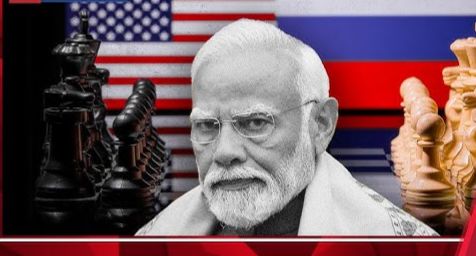 Image Source: YouTube
Image Source: YouTube
Key Highlights on India’s Stakes in the 2025 Alaska Summit
The Alaska summit, scheduled for August 15, 2025, between US President Donald Trump and Russian President Vladimir Putin, is being closely monitored by India for its significant geopolitical and economic implications.
India stands at a complex crossroads as the world’s largest buyer of Russian crude oil, importing about 35-40% of its total oil needs from Russia, largely at discounted prices amid ongoing Western sanctions.
The summit’s outcome could reshape US-Russia relations, influence the trajectory of the Ukraine conflict, and determine the future of sanctions impacting India’s energy security and trade balance.
India balances deep historical ties with Russia alongside growing strategic partnerships with the US, the EU, and other global powers, making the summit a delicate diplomatic juncture.
Potential changes in sanctions regimes or economic concessions emerging from the summit could affect India’s rupee stability, trade surplus, and access to competitively priced energy.
India’s Prime Minister Narendra Modi has expressed clear support for the summit and emphasized the need for an early, peaceful resolution to the Ukraine conflict—India aligns itself with peace but must navigate complex competing interests.
India has been targeted by US tariffs for Russian oil imports, making the summit’s decisions critical for Indian economic interests and foreign policy balancing acts.
The summit's Alaska location holds symbolic weight, reflecting historic ties and ongoing Arctic strategic concerns involving Russia and the US.
The broader global context includes Asia-Pacific summits like the Shanghai Cooperation Organisation (SCO) meeting in Tianjin, showing interconnected diplomatic efforts in Eurasian politics, where India also plays a pivotal role.
Why the Alaska Summit Matters to India’s Energy and Economic Outlook
India’s escalating imports of Russian crude at discounted rates have been a key buffer against global energy price surges, helping moderate inflation and support manufacturing competitiveness since the Ukraine conflict escalated in 2022. In the first half of 2025, India imported over 1.75 million barrels per day from Russia, reaching an 11-month high by June. Any shift in US sanctions or Russian access to global markets could drastically affect these imports, raising costs domestically and pressuring India’s fiscal and trade balances.
Asia’s geopolitical chessboard is further complicated by the possibility of US concession offers to Russia involving Alaska's natural resources, entangling Indian interests more deeply in the balance of power. A failure of the summit could prompt stronger sanctions or tariffs, with ripple effects on India’s ability to maintain its trade surplus with Russia, potentially causing volatility in the Indian Rupee and currency markets.
India’s Diplomatic Tightrope: Balancing Major Powers
Historically close to Russia, India has sought to maintain strategic autonomy by cultivating relations with both Washington and Moscow amid their deteriorating ties. The US-Russia summit’s outcome will affect India’s foreign policy calculus, especially around defense procurement, energy security, and multilateral partnerships.
Prime Minister Modi’s recent calls for a peaceful resolution and his diplomatic engagements underscore India’s pursuit of stability in an unstable global environment, while safeguarding its development goals. India supports Ukraine’s sovereignty but also aims to retain constructive ties with Russia, crucial for regional security and its own geopolitical ambitions.
Looking Ahead: Potential Scenarios and Global Impact
A successful summit with peace talks progressing could help ease international pressure, reducing the risk of harsher sanctions on Russia and, by extension, on India.
Conversely, a stalemate might harden US policies, trigger increased tariffs on Indian imports, and complicate India’s economic navigation amid mounting global uncertainties.
The summit’s aftermath will also influence upcoming multilateral forums, such as the SCO summit hosted by China in Tianjin, where India plays a vital role in shaping regional cooperation.
In Summary
India’s close watch on the Alaska summit reflects its critical position amid evolving global geopolitics marked by the US-Russia rivalry and the enduring Ukraine conflict. Energy security, economic stability, and diplomatic balance underpin India’s vested interest in the summit’s success or failure. The decisions made in Alaska on August 15, 2025, could significantly alter India’s strategic trajectory while impacting broader international relations and trade ecosystems.
Sources: The Tribune, Economic Times, Dhanam Online
Advertisement
Advertisement


